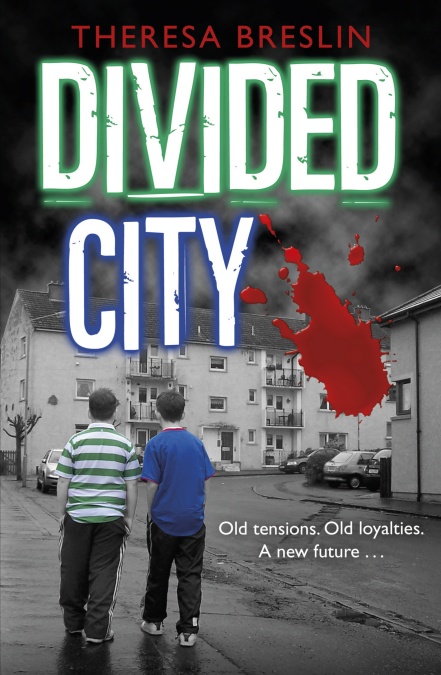Lesley Agnew (owner/manager of the Children’s Bookshop Muswell Hill, London)
Walking home from football training, Graham, – a committed Glasgow Rangers supporter – witnesses a gang chasing and attacking another boy. So begins a compulsive contemporary novel, exploring traditional tensions between Protestants and Catholic football supporters plus the plight of asylum seekers adrift in the city. A compelling social message is built up against the backdrop of Glasgow’s historic emnities. There is also, for Graham, a dawning realisation of the dangers many asylum seekers face. Coupled with this are raw accounts of a poverty-stricken environment. As Graham’s father puts it, “Deprivation, and all that goes with it, is what really divides this city.”
Sonia Benster (proprietor, Children’s Bookshop, Huddersfield)
Theresa Breslin’s Divided City tackles religious and social bigotry in present-day Glasgow. Which football team you support, where you live, your name – everything defines the two boys from different backgrounds who would be friends. Not only have they to contend with old rivalries, they must also deal with present-day society’s attitude to asylum seekers. This political and religious cocktail makes for a thought-provoking read for teenagers.
Lindsey Fraser, Literary Consultant
Theresa Breslin’s Divided City is already attracting press attention, reflecting as it does the sectarian tensions that continue to scar British society, in this case Glasgow. Like many of Breslin’s novels, this has central characters who can’t look the other way. They become embroiled in a situation rooted generations back. The danger of a novel so closely associated with a real place is that the accompanying press attention could distract from the writing. However, Breslin’s voice is uncompromising and fierce, and readers won’t find it easy to close the book without taking it to heart.
Willy Maley, Professor of Literature, Glasgow University
Breslin’s book is broad-minded and bold in the way it refuses to dodge the issues while at the same time trying to give as balanced a view as a writer can of the prejudice that divides friends, families and neighbours. Breslin’s book will grab a few headlines, and if it gets people thinking, especially young people, but just as importantly, adults, then it’s done some good. The fact that it’s also a great wee story is a bonus.
Catriona Parnell (Aged 17)
The book follows two boys, one Catholic (Joe), one Protestant (Graham) in Glasgow. They meet while playing football – United for Glasgow. Graham is a witness to a racial attack on an asylum seeker (Kyoul). Kyoul asks him to help him. Graham is drawn into the situation discovering more about issues facing asylum seekers such as racism. Joe and Graham soon become good friends, overcoming their religious backgrounds. Together Joe and Graham befriend and help Kyoul. In the end Joe and Graham become firm friends and are both chosen to play for Glasgow.
This book is excellent for dealing with sectarianism issues as it addresses the difficulties faced by young people. It also shows how these issues can be overcome and why sectarianism is wrong. It deals clearly with the sectarian issue and does not lessen the impact by avoiding the issue or masking it with a range of storylines. It also deals with issues of citizenship, racism and violence through the asylum seeker story.
The book is very easy to read. It has a good plot which moves along at a good pace. The book is well constructed and well written. The author uses language which is easy to understand without making the book simple and boring. A ‘must read’ for all teenagers and adults!

